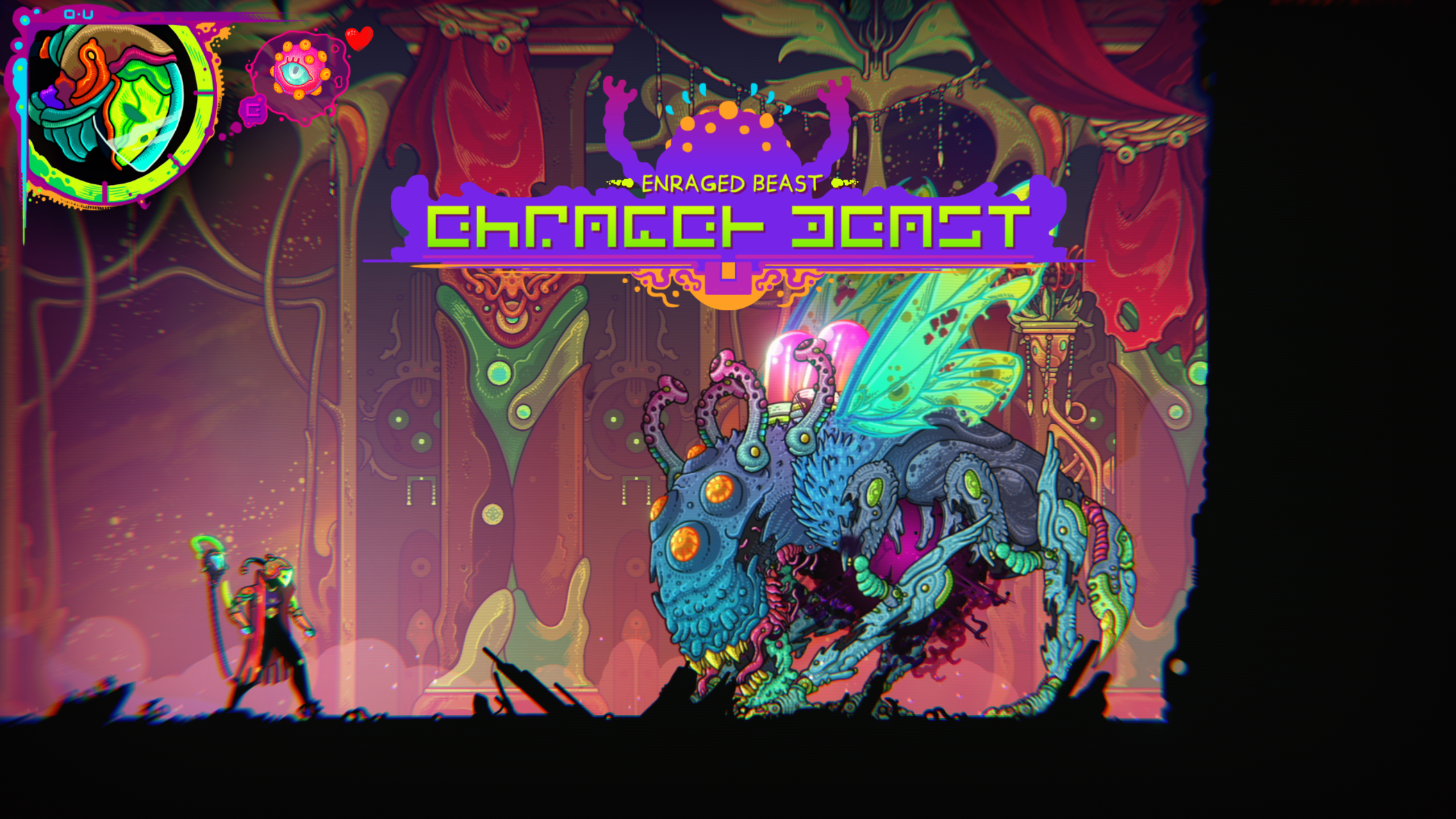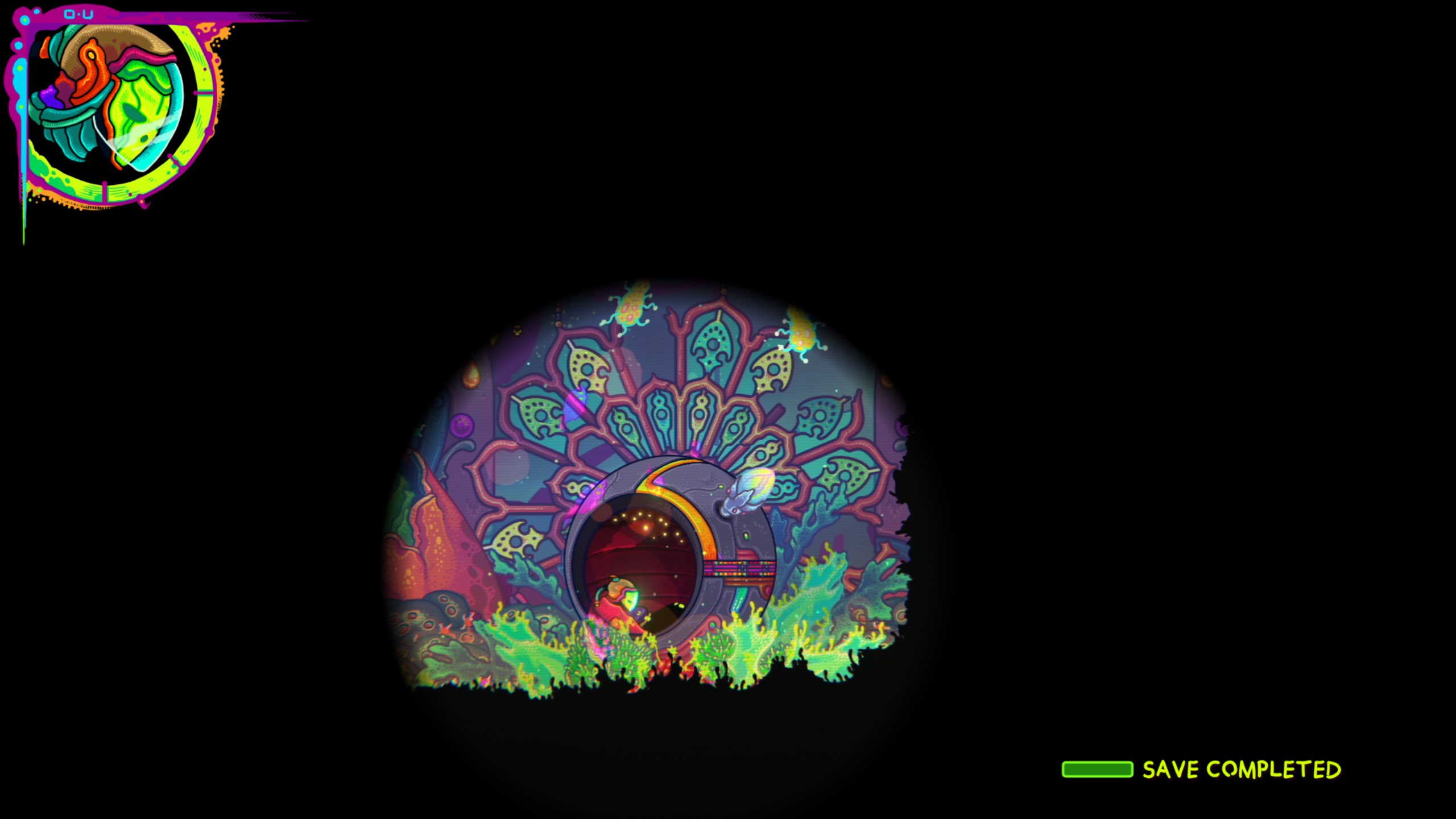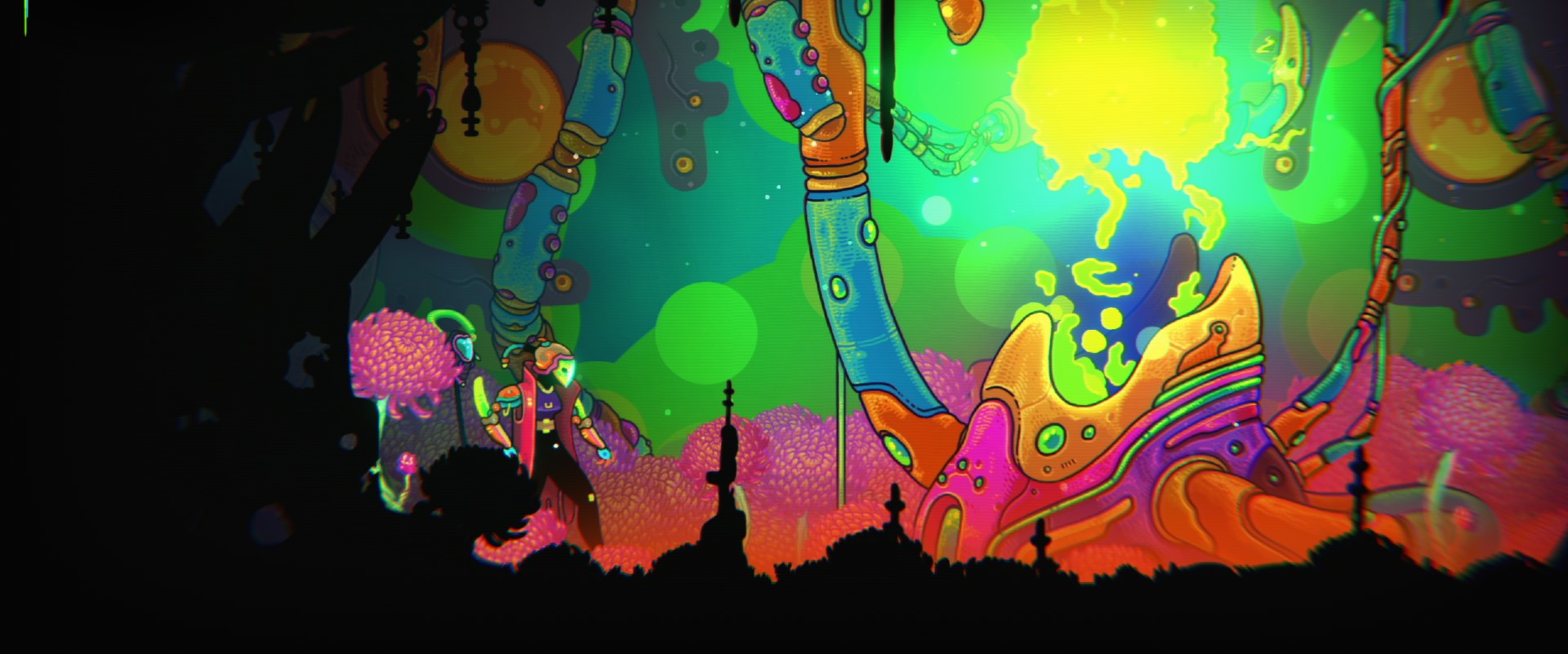GamesRadar+ Verdict
Ultros takes the tried and tested Metroidvania formula, flips it on its head, bathes it in neon paint, switches dimensions, adds gardening mechanics and sends it to an outer-space uterus housing an ancient demon – and it all, somehow, works
Pros
- +
Stunning visuals, animations and artstyle
- +
Impeccable balance of fast-paced and chilled out
- +
Tone and vibes like nothing else in the genre
Cons
- -
Narrative is (unashamedly) secondary
- -
Environments are occasionally difficult to parse
Why you can trust GamesRadar+
I'm a couple of hours into Ultros and I'm facing my biggest challenge yet. This won't be easy, but let me try to illustrate the scene. I'm trapped somewhere in the bowels of the Metroidvania's colorful labyrinthian sprawl, a setting named The Sarcophagus that's described as a "cosmic uterus holding an ancient, demonic being". I'm staring down a hulking lump of a beast – a bruised and battered oversized fly who's equipped with impenetrable armor and is tearing stalactites from the roof to be used as projectile weapons. Its punctured wings, glowing bright neon green, struggle to lift its body from the ground; and its eyes, beady and fiery orange, shoot devastating purple laser balls that chase me around the battle arena.
Release date: February 13, 2024
Platform(s): PC, PS5, PS4
Developer: Hadoque
Publisher: Kepler Interactive
Pint-sized in comparison, I use the floating 'Extractor' that's tethered to my cherry red duster like a pet on a leash to activate a genre-staple double-jump. I hoist myself onto the boss' back, hammer the attack button, and drain the insect's health by slashing at the pink power source fused to its spine. Filling the high-top sneakers of protagonist Ouji, I think I might be a bug myself – I have elongated features hidden inside a green mask from which antenna protrude – and in order to restore vitality, I munch on things like Pompom Larvae, a resource harvested from enemies felled elsewhere in the wild. Sound weird? Of course it does. But even stranger still, even in the throes of such unhinged and inexplicable chaos, Ultros is always, somehow, super chill.
Coming in hot

Ultros is such a vibe. If you take one thing away from this review, let it be that. I can't remember the last time I played a game that so perfectly understands what it is, while simultaneously appearing to not care about how it's perceived. Hotline Miami is one classic that springs to mind to this end, and not just because Ultros' striking visuals are the work of Niklas Åkerblad, a.k.a. El Huervo, who created the cover art for Dennaton's brutal top-down shooter series. Ultros and Hotline couldn't be more different in genre and conceptual terms, granted, but they both show unwavering commitment to their core gameplay loops from start to finish; they drop players into their worlds with predetermined rules, give them the tools to succeed, and then step back and watch everything unfold.
Ultros is a Metroidvania game in that its interlinked map is gated at specific junctures, where incrementally-accrued abilities let you reach once inaccessible areas. Bosses, like the one mentioned above, protect the rulers of this world, who're named Shaman. Boss battles, on the other hand, are rhythmic affairs that involve deciphering attack patterns that often lean on these abilities; while deft platforming links each Shaman-guarding boss fight in turn.
But where Ultros stands apart from other genre similars is in its finer details. It does all the good stuff right – its abilities are neat, it has tight controls, solid level design, and rewarding combat – but there's an ebb and flow to everything that's as satisfying as it is wondrous. The psychedelic aesthetic and fantastical surroundings help perpetuate this, but there's an ease to Ultros that's more atmospheric, moodier, and, where my job becomes a bit more difficult, a little harder to put into words. Ultros feels good, even in its most frustrating and frantic moments, which is something I've rarely felt in any video game, and have certainly never felt in the Metroidvania space.
As such, Ultros offers unexpected tinges of Journey, Flow, and The Unfinished Swan – games that are front-facing in their expression and exploration, and so confident and uncompromising in what they want to achieve. Games that take place in overgrown sarcophaguses situated in outer space probably need to be all of the above, but Ultros extends its idiosyncratic approach to the genre with combat that rewards good timing. Once killed, hostile creatures drop body parts and organs that can be consumed to boost nutrition levels. Dead enemies will always drop something, but only by performing varied executions, dodging and striking at the perfect moments (identified by on-screen prompts), will you be able to harvest the most nutritional parts. "Battered" Pompom Larvae are billed as "rendered limp and lifeless", for example, while those acquired from well-finessed kills are described as "firm and still writhing".
Consuming enemy body parts is the primary means of health replenishment in Ultros, but doing so also extends to the game's skill tree. Accessed via its pod-shaped 'Cortex' save points, new abilities can be unlocked against your nutrition levels. Different organs boost different levels, making finesse in combat even more important as you shape and grow Ouji's character. Once an ability is unlocked, a new one appears on Cortex's spider diagram-like display. Early doors, simple abilities like Sneaking can be activated, while maneuvers like Drop Kicks, Wall Jumps, Air Tesseracts, and many more can be uncovered over time.
Weekly digests, tales from the communities you love, and more
Garden angel

"Just when you thought Ultros couldn't get any more outlandish, it has its own gardening system."
Just when you thought Ultros couldn't get any more outlandish, it has its own gardening system. Early on in your quest, you cross paths with a pleasant and originally-named chap called Gärdner, who teaches Ouji the values of cosmic uterus-based horticulture. Gardens are scattered around The Sarcophagus, and, using seeds that are also dotted around the map, you can grow special fruits that provide a variety of nutritional boosts. The deeper you wade into the game, the more savvy you'll become about which seeds grow which fruits, in turn informing the quickest and most efficient ways to gain nutrition and then gain the best abilities from the Cortex. If it makes you feel any better, I've read and re-read that last sentence myself several times and can't quite believe it applies to everything else above – but that's another example of Ultros' irregular twist on the Metroidvania formula.
Even the way you accrue core Metroidvania power-ups in Ultros is unconventional. The Extractor – the aforementioned floating tether thingamajig that let me double jump against the giant fly baddie – is said to be a tool once used by the Shaman in ritual ceremonies. In practice, it's this device that lets you double jump and air dash and execute the wealth of familiar abilities that underpin the Metroidvania genre; a shopping list of powers that'll ultimately help you uncover all pockets of the map and overcome the guardians who stand in your way.
To the latter end, once you've defeated each boss, you'll execute a Shaman, and then find yourself teleported to a familiar pocket of The Sarcophagus – after which you must travel back to the scene of the crime. Why? Time in this world, you learn, is on a repeating loop (one of Ultros' few concessions to video game conformality), and only by defeating these overlords one-by-one, and then awakening the Ultros demon itself, can you hope to break the cycle and earn your freedom from the confines of this weird and wonderful space uterus.
All of which means one of Ultros' core features is about making you retread old ground again and again. And yet, while this would almost certainly be a negative facet in a lesser game, here it forces you to learn the landscape and allows you to spend more time being swept off your feet by its wonderful moment-to-moment exploration and never-not-immaculate vibes. Moving back and forth is a core tenet of Metroidvania games far and wide, of course, but by folding the process into its uber-abstract narrative, Ultros is able to double down on its weirdness, its hazy allure and its incongruous yet engrossing pacing.
Ultimately, Ultros is a deceptively deep and mechanical Metroidvania driven by its eye-watering psychedelic vibes. It's not easy to do something that feels unique and fresh in video games, especially within a genre that's thriving at the moment. With this in mind, I don't think I've ever played a game like Ultros, and for that alone it's worth recommending. I certainly haven't written the words "cosmic uterus-based horticulture" in anything I've published before, and, surely, will never do so again.
Ultros was reviewed on PC, with code provided by the publisher
More info
| Genre | Metroidvania |

Joe Donnelly is a sports editor from Glasgow and former features editor at GamesRadar+. A mental health advocate, Joe has written about video games and mental health for The Guardian, New Statesman, VICE, PC Gamer and many more, and believes the interactive nature of video games makes them uniquely placed to educate and inform. His book Checkpoint considers the complex intersections of video games and mental health, and was shortlisted for Scotland's National Book of the Year for non-fiction in 2021. As familiar with the streets of Los Santos as he is the west of Scotland, Joe can often be found living his best and worst lives in GTA Online and its PC role-playing scene.



